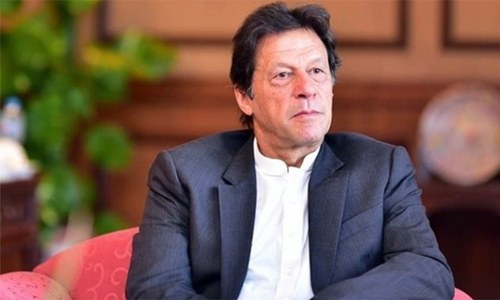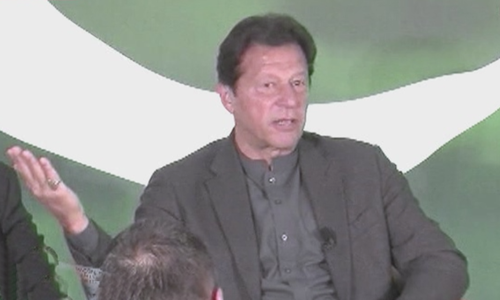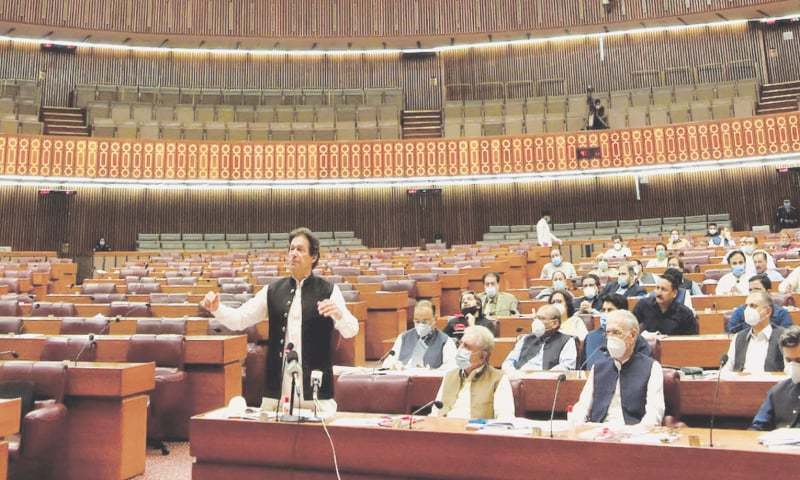SPEAKING at a dinner for coalition lawmakers recently, the prime minister had boasted: “we are the only choice”. Maybe his words were meant to calm down disgruntled allies and were also a way of letting an increasingly aggressive opposition, baying for his blood, know that he was not going anywhere. But whose ‘choice’ was he alluding to?
It was not a speech given at the hustings. For some, it amounted to a habitual arrogance and a feeling of illusory superiority. But there was more to the assertion that came in the midst of the widening cracks within a fragile coalition and growing discontent within party ranks.
Some observers took the prime minister’s remarks as meant for the security establishment, ie ‘we are still your best bet’. It is evident that the establishment’s continued support is critical to keeping intact a fractious ruling coalition that has been further shaken by the exit of Akhtar Mengal’s BNP-M and the threats of some other parties to abandon ship.
Moreover, the public remarks of cabinet ministers have further added to the government’s woes. Surely the passing of the budget has come as a relief for the ruling elite, but the crisis of confidence is far from over. A major challenge for the prime minister is how to save the coalition from falling apart.
The opposition seems to have become more coherent and forceful in challenging the government.
Meanwhile, a seemingly more united opposition has stepped up its attack targeting the prime minister in particular. The government’s mishandling of the ongoing pandemic, the worsening economic situation, and the various scandals highlighting the crisis of governance have provided the opposition ammunition with which to target a beleaguered administration.
That has at least forced the prime minister to come down from his pedestal and try and placate disgruntled allies and appease party dissidents. It has certainly not been Imran Khan’s approach to get directly involved in such political manoeuvring. The responsibility had earlier been left to Jahangir Tareen and some other party leaders.
The dinner that was followed with a series of meetings with allied party leaders is seen by many as a desperate attempt on Prime Minister Imran Khan’s part to salvage the situation. But there are still questions regarding how he can emerge from what can only be described as a subjective reality.
One tangible change in the prime minister, perhaps prompted by internal criticism, is his more frequent appearances in the National Assembly in the past week. That is certainly a good omen. But some of his remarks during the budget session have certainly exposed a lack of understanding of some critical national security issues.
For instance, the comment in which Osama bin Laden was described as a ‘martyr’ did not appear to be a slip of the tongue but something that he really believed. He has never been clear about the threat that militancy and terrorism pose to this country. One wonders what was the need for raising the OBL issue that has caused embarrassment to the country. But it is not the first time that such comments have been made by the prime minister, that risk misrepresenting Pakistan’s position on critical foreign and security policy issues.
The real issue, however, is whether or not the prime minister can improve governance and deliver on his promise of change. Almost two years in power, the government is still struggling to find a direction and is lacking in several areas. Policy bungling, whether it involves sugar or petroleum, is conveniently blamed on some unidentified mafias.
‘Accountability’ is the new mantra for the government that uses it in order to distract attention from its own disastrous performance in practically all fields and public institutions. Unfortunately, the government is not showing itself to be capable of rational judgement. Many believe that the government’s increasing dependence on the security establishment for survival has further undermined its ability to improve and correct course. Is there a feeling in the top leadership that it is indispensable to those who are perceived as having brought them to power? If so, some lessons should be drawn from Pakistan’s political history that shows how the game of thrones changes in this country.
There have been many others in the past, who have suffered from a similar sense of being indispensable, but it took no time at all for them to fall from grace. They have learnt this history lesson hard. By weakening parliament and other institutions of the state, a government digs its own grave.
The establishment’s extending shadow can be discerned in all dimensions of the state, and the perpetual state of confrontation among political forces gives it further space. The power balance has long been perceived as residing in Pindi and, given the worsening political confrontation, the establishment is once again emerging as an arbiter of political power in the country.
Despite being under constant pressure because of their leaders being jailed or summoned by NAB for investigation, the opposition seems to have become more coherent and forceful in challenging the government. Its strategy now seems to encourage an in-house change through an internal party revolt.
The old minus-one formula is once again being talked about. That has not worked in the past and it’s not likely to deliver this time either. It presumes extra-parliamentary intervention that would have its own political consequences. It seems that the opposition realises that mid-term elections will not provide any solution to the multiple challenges the country is facing at the moment. In fact, it will further intensify political polarisation, which this country cannot afford.
There is an urgent need for a broader political consensus on dealing with the serious health, economic and governance crises. That is only possible if the prime minister accepts the gravity of the situation. For that, he needs to cast aside dangerous delusions such as ‘we are the only choice’ and ‘après moi, le déluge’.
The writer is an author and journalist.
Twitter: @hidhussain
Published in Dawn, July 1st, 2020














































